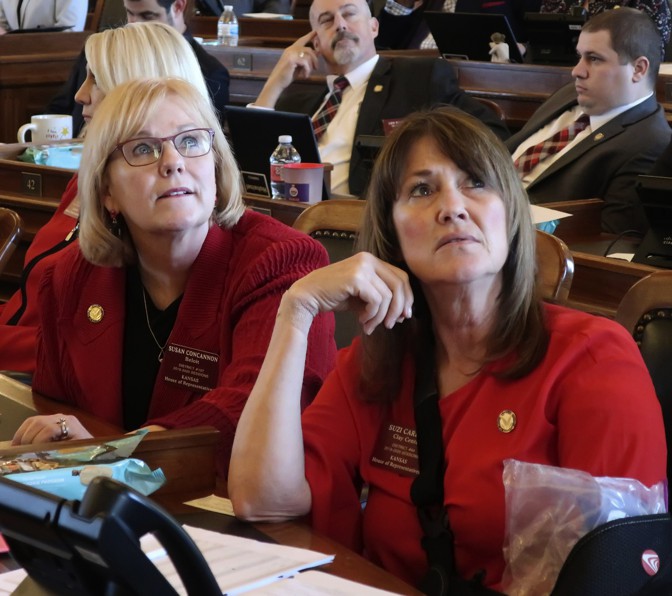The Atlantic Politics & Policy Daily: On Speeching Terms
What We’re Following Today
It’s Thursday, March 21.
‣ Flooding in Nebraska after a bomb cyclone this week has caused more than $1 billion in damage, the state’s governor said. More than 2,000 homes and 340 businesses were estimated to have been damaged or destroyed.
Here’s what else we’re watching:
A Little Redundant: President Donald Trump signed an executive order directing agencies to “take appropriate steps” to make sure colleges receiving federal research funding are promoting free speech on campus. The thing is, colleges are already legally required to do that.

Long Time Coming: President Trump on Twitter encouraged the United States to recognize Israeli sovereignty over the Golan Heights, a disputed territory on the border of Israel and Syria. But this was no impulse tweet, Kathy Gilsinan writes: It was at least one year in the making.
What to Expect From the Health-Care Conversation: Despite the ongoing debate among Democrats over the future of universal health care, and the advantages and disadvantages of various Medicare for all bills, the 2020 presidential race won’t just be about single-payer health care, writes Ronald Brownstein: Trump still wants to repeal Obamacare.
A New Home for Hate: Since 2016, social-media companies like Facebook and Twitter have come under harsh scrutiny for allowing accounts to spread misinformation and preach white supremacy and other extremist ideologies. But that misinformation is also thriving on Instagram.
Four Big Myths: As the most segregated school system in the U.S. grapples again with diversity in its student body, the debate is rife with misunderstandings. One is the persistent myth that reforming the high-school admissions process will solve schools’ diversity problem.
The Art of the Argument: Most American families are in step with one another politically (though at least one family—the White House adviser Kellyanne Conway and her husband, George—made headlines in recent days for disagreeing publicly about the president). Here’s a framework for how to have a peaceful, productive political conversations with your family members.
With the Eyes of the World Upon Her: In the aftermath of the deadly mosque shootings in New Zealand, Prime Minister Jacinda Ardern has spoken out against publishing the gunman’s manifesto and announced a ban on semiautomatic weapons and assault rifles. Her leadership, and her country’s response, contrast with the standoff politics currently roiling the U.S. and Great Britain, writes Krishnadev Calamur.
Snapshot

Kansas state Representatives Susan Concannon, left, and Suzi Carlson, right, watch an electronic tally board as the House approves a Medicaid expansion bill on Thursday at the Statehouse in Topeka. (John Hanna / AP)
Ideas From The Atlantic
Nazis Have Always Been Trolls (Adam Serwer)
“Ultimately, as with the New Zealand shooter, every joke, every pithy reference, every pretend gesture toward the moral standards of liberal democracy has the same punch line: We are going to kill you.” → Read on.
Chelsea Clinton in the Hall of Mirrors (Conor Friedersdorf)
“This episode illustrates that when the constant focus is on the boundaries of legitimate speech, little time or attention is left for substance. And what’s said to constitute bigotry keeps expanding without any apparent limit.” → Read on.
Midwestern Flooding Isn’t a Natural Disaster (Christine A. Klein)
“Back in the nation’s flooded regions, it is inspiring to watch midwesterners help one another rebuild. But the key is to rebuild without repeating past mistakes.” → Read on.
The Intensity of the Debate Makes It Hard to Formulate Sound Public Policy (David Frum)
David Frum responds to criticism of his latest story on immigration, “If Liberals Won’t Enforce Borders, Fascists Will”:
“But the existing people of the country, in all their imperfection—don’t they have to be a first concern? Immigration eases the consequences of disregarding their troubles, and corrodes the political consensus for social reform. Maybe it does not always have to be that way. But in the United States, it has been that way.” → Read on.
What Else We’re Reading
‣ Inside Alexandria Ocasio-Cortez’s Unlikely Rise (Charlotte Alter, Time)
‣Mitch McConnell: Nihilist in Chief (Alex Pareene, The New Republic)
‣How Trump Is on Track for a 2020 Landslide (Ben White and Steven Shepard, Politico)
‣Katie Couric Reflects on That Controversial 2008 Interview With Sarah Palin (David Mack, BuzzFeed News)
‣ Why Donald Trump Is Desperate for Britain to Declare Independence (Edward Luce, Financial Times) (? Paywall)
We’re always looking for ways to improve The Politics & Policy Daily. Comments, questions, typos, grievances and groans related to our puns? Let us know anytime here.
Were you forwarded this newsletter? Sign up for our daily politics email here. We have many other free email newsletters on a variety of other topics. Find the full list here.

 Ethicoin: Securing the Post-COVID-19 Future
Ethicoin: Securing the Post-COVID-19 Future  A Proclamation on National Crime Victims’ Rights, 2024
A Proclamation on National Crime Victims’ Rights, 2024